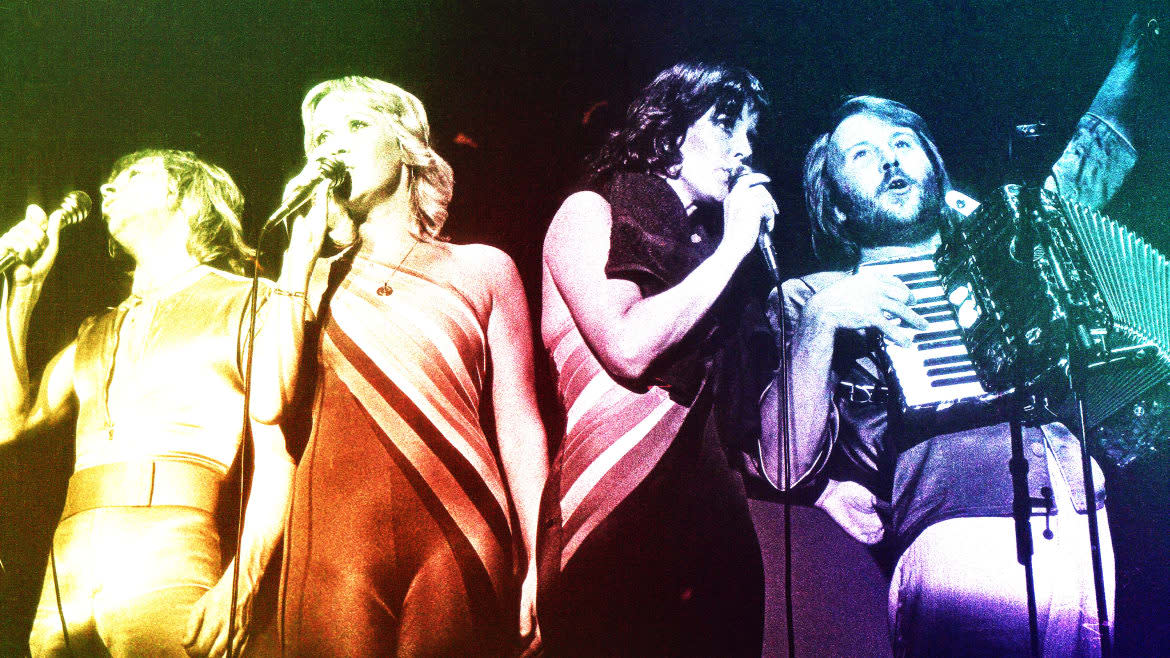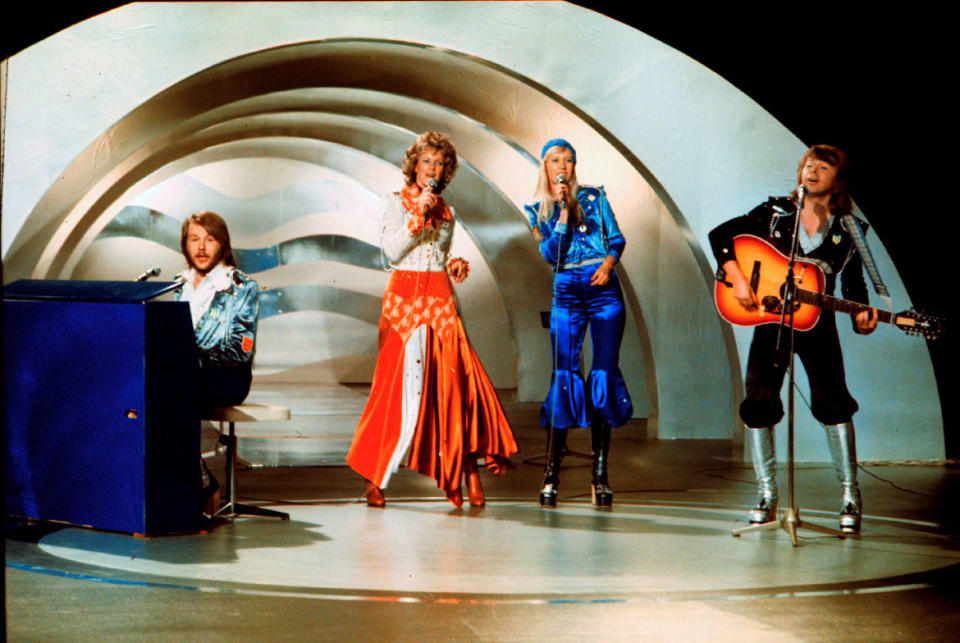What Makes ABBA So Timeless? Let Us Count the Ways

- Oops!Something went wrong.Please try again later.
It’s 7:45 p.m. on a Thursday and I’m about to see ABBA live at the Queen Elizabeth Olympic Park in London. Well, not exactly—in fact, the band hasn’t performed in the U.K. capital in over 40 years. Rather, I’ll be seeing hologram-style figures, cleverly dubbed “ABBAtars,” of the Swedish supergroup as part of ABBA Voyage, a show that had sold hundreds of thousands of tickets before it even debuted last May.
Nearly a full year after the show premiered, ABBA Voyage is still pulling in massive crowds—I had to get tickets months in advance—attracting fans of all ages from all over the world. It’s been so successful that there have been recent talks to take the ABBAtars on tour. The 90-minute show—which features 3D-style footage of the Swedish pop stars, modeled in their likeness from 1977, performing their greatest hits—isn’t the only ABBA attraction making waves. In the U.S., there are all sorts of ABBA-themed parties (I swear there’s at least one a month where I live in Washington, D.C). It begs the question: What makes this band’s music so beloved more than four decades after their debut?
First, a little background on our Swedish superstars: ABBA was formed in Stockholm in 1972 by Agnetha Fältskog, Björn Ulvaeus, Benny Andersson, and Anni-Frid Lyngstad (the band gets its name from the first letters of each member’s name). But the band really “made it” when they won the 1974 Eurovision Song Contest, singing their hit single “Waterloo.” ABBA stayed active for about 10 years, releasing eight studio albums, but eventually broke up in December 1982.

Abba won the Eurovision Song Contest in England with "Waterloo" in 1974.
To learn a bit more about the perception of the group over time, I spoke to ABBA historian Carl Magnus Palm, who remembers being surrounded by their music while growing up in Sweden. “It wasn’t like you could escape ABBA if you were in Sweden,” he told me. During the first leg of ABBA’s career in the 1970s, they received mixed reviews—one critic famously wrote, “We have met the enemy, and it is them.” As Palm explains, the attitude toward them at the time was that they made good pop music, but it wasn’t taken as seriously as it would be nowadays.
Palm started chronicling the band in 1992, right around when “the ABBA revival” began, bolstered by the release of the greatest hits compilation ABBA Gold. When he first started writing a book about the group, people told him he had to get it out soon or else it wouldn’t be relevant. “But since the late ’90s, no one has said that anymore. They realize ABBA is here to stay.”
When asked why he thinks ABBA’s music has managed to stick around and stay relevant, Palm had a few ideas. For one, the production value sounds surprisingly modern. “It’s not too far removed from the music of today,” he says. He also points out how listeners have a strong inclination toward melodies you can hum along with—and ABBA’s music certainly has its share of catchy tunes, from “Dancing Queen” to “Gimme! Gimme! Gimme! (A Man After Midnight).”
“The music is upbeat, it makes me feel happy, it’s easy to dance to,” Charlie Smith, a 23-year old ABBA fan, reiterated to me. “You can sing along to it in the car. You can play it at a wedding and everyone is going to know it. It’s a point of connection for people.”
Nate Sloan, an assistant professor of musicology at the University of Southern California, offered a deeper analysis. He emphasized the unique juxtaposition of ABBA’s two lead singers (Anni-Frid and Agnetha) as a key component of their sound. “If the two vocalists are singing the same note, it adds this really cool color to have their different vocals, giving each of their own interpretation,” he says.
Lasse Wellander, Longtime ABBA Guitarist, Dies at 70
Sloan also pointed to the band’s uniquely immersive “maximalist pop” sound. “There is so much happening in ABBA songs,” he explains. “It’s very orchestral. ‘Mamma Mia’ is a great example of this. You hear a marimba at the very beginning of the song, but then you also have synthesizers. It’s this mix of tradition, orchestral, symphonic, and then very new synthesis, electronic.”
Also integral to ABBA’s longevity is the global appeal of their discography. Palm and Sloan attribute this to a number of factors, including the group’s efforts to translate their music into Spanish, and both emphasize how the music is international in and of itself, taking influence from the U.S., U.K., and Europe.
“This music isn’t really connected to a certain time or place,” Sloan says. “It doesn’t sound traditionally Swedish. It doesn’t quite sound like pop music of the 1970s or ’80s. It has elements of disco, soul, classical, and bubblegum pop, but it’s a unique melange of all this stuff. There’s a little something for everyone in that sense.”
‘Big Mouth’ Season 6 Wins Musical Episode of the Year With ‘Mamma Mia!’ Parody
Beyond the music itself, there are a lot of reasons why ABBA has stayed in the public consciousness—chief among them, Mamma Mia! The jukebox musical first opened on the West End in 1999, featuring countless songs composed by ABBA and members Benny Andersson and Björn Ulvaeus. A star-studded, deliciously campy film adaptation was released in 2008, followed by a hit sequel in 2018.
Mamma Mia! is a key factor that plays into the band’s relevance—nowadays, it’s the way many younger fans, including myself, are introduced to the music of ABBA.

Benny Andersson, Agnetha Fältskog, Anni-Frid Lyngstad and Bjorn Ulvaeus of ABBA attend the first performance of ABBA "Voyage" in London.
“It’s divorced from ABBA themselves because the songs have been put in a new context and mean something else when they’re in Mamma Mia! performed by these other singers,” Palm says. “But it’s one of many things that’s constantly going on to keep ABBA’s music and the ABBA phenomenon in the spotlight.”
TikTok has also breathed new life into the band’s legacy. Whether it’s the “Chiquitita” riff, an “Angel Eyes” lip-sync or a group recreating the iconic “Lay All Your Love On Me” performance from Mamma Mia!, ABBA songs are all over the video-sharing app. Most of the time, the content doesn’t have anything to do with ABBA or Mamma Mia! at all, instead hinging on the music itself.
“There are catchy hooks, which are perfect for TikTok dances,” Smith explains. “The lyrics are theatrical and perfect for TikToks.”
And ABBA themselves have wholeheartedly leaned into their TikTok virality—the band joined the app in August 2021, using it to promote their latest album, 2021’s Grammy-nominated Voyage, over the subsequent months. They’re still active to this day, boasting more than 3 million followers.
Back at the ABBA Voyage show in London, the band’s generational and global appeal never seemed more obvious; as I looked around the room, it was clear there was no dominant demographic of the rapturous attendees. There were millennial couples. There was a teenage boy belting the lyrics to “Dancing Queen.” There was a man in about his fifties singing along to almost every song, already sporting an ABBA Voyage sweatshirt. There were women in their sixties, dressed up like ABBA, shaming the rest of us for not getting into the spirit with our own glittery costumes. There were countless mothers and daughters, embracing each other during “Thank You for the Music.”
The ABBA magic is indeed alive and well in 2023—and there’s no sign of this particular voyage ending anytime soon.
Get the Daily Beast's biggest scoops and scandals delivered right to your inbox. Sign up now.
Stay informed and gain unlimited access to the Daily Beast's unmatched reporting. Subscribe now.

